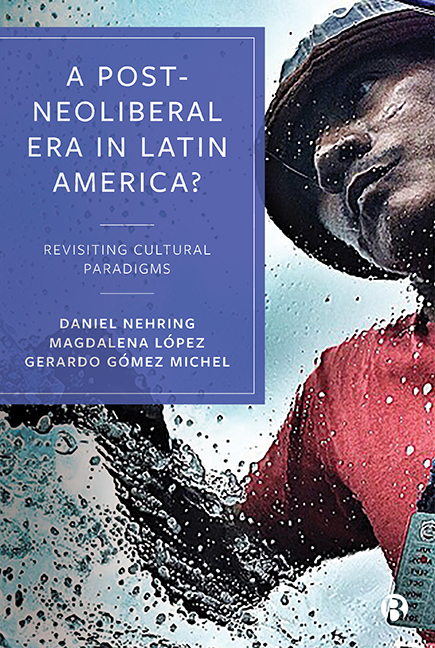Book contents
- Frontmatter
- Contents
- List of Tables and Figures
- Notes on Contributors
- 1 Introduction: Everyday Life in (Post-)Neoliberal Latin America
- 2 Imaginaries, Sociability and Cultural Patterns in the Post-Neoliberal Era: A Glance at the Argentinean, Paraguayan, and Venezuelan Experiences
- 3 Making Neoliberal Selves: Popular Psychology in Contemporary Mexico
- 4 From Uribe’s “Democratic Security” to Santo’s Peace Accords with the FARC: Hate, Fear, Hope and other Emotions in Contemporary Colombian Politics
- 5 Cine Bajo Tierra: Ecuador’s Booming Underground Cinema in the Aftermath of the Neoliberal Era
- 6 Neoliberalising Humanity: Culture and Popular Participation in the Case of the Street Market of Caruaru, Brazil
- 7 The Contribution of the Catholic Magazine Espacio Laical and the Constitution to the Cuban Public Sphere
- 8 Argentina: The Philosophical Resistance to the Conquest of the Soul1
- 9 Fleeing (Post-)Chávez Memories: The 1990s and the Black Friday Generation
- 10 Re-imagined Community: The Mapuche Nation in Neoliberal Chile
- 11 Neoliberalism and the Negotiation of the American Dream in Contemporary Latina Narratives
- 12 Bare Life in Contemporary Mexico: Everyday Violence and Folk Saints
- Index
2 - Imaginaries, Sociability and Cultural Patterns in the Post-Neoliberal Era: A Glance at the Argentinean, Paraguayan, and Venezuelan Experiences
Published online by Cambridge University Press: 20 April 2022
- Frontmatter
- Contents
- List of Tables and Figures
- Notes on Contributors
- 1 Introduction: Everyday Life in (Post-)Neoliberal Latin America
- 2 Imaginaries, Sociability and Cultural Patterns in the Post-Neoliberal Era: A Glance at the Argentinean, Paraguayan, and Venezuelan Experiences
- 3 Making Neoliberal Selves: Popular Psychology in Contemporary Mexico
- 4 From Uribe’s “Democratic Security” to Santo’s Peace Accords with the FARC: Hate, Fear, Hope and other Emotions in Contemporary Colombian Politics
- 5 Cine Bajo Tierra: Ecuador’s Booming Underground Cinema in the Aftermath of the Neoliberal Era
- 6 Neoliberalising Humanity: Culture and Popular Participation in the Case of the Street Market of Caruaru, Brazil
- 7 The Contribution of the Catholic Magazine Espacio Laical and the Constitution to the Cuban Public Sphere
- 8 Argentina: The Philosophical Resistance to the Conquest of the Soul1
- 9 Fleeing (Post-)Chávez Memories: The 1990s and the Black Friday Generation
- 10 Re-imagined Community: The Mapuche Nation in Neoliberal Chile
- 11 Neoliberalism and the Negotiation of the American Dream in Contemporary Latina Narratives
- 12 Bare Life in Contemporary Mexico: Everyday Violence and Folk Saints
- Index
Summary
Introduction
Toward the mid-1980s, the intersection between developmental cepalismo and the foreign debt crisis destabilized the political and cultural consensus regarding development in the region. This allowed the emergence of adjustment policies that leaned toward neoliberal measures as anti-crisis economic programs. Neoliberalism presented itself as a vast economic, political, and legislative redevelopment plan, providing the right answers when it came to the economic policies needed to target the systemic chaos in the region. The new bureaucrats managed to turn their structural adjustment program into a new mantra and into economic policies through the construction of meaning as a powerful offensive strategy. This was mainly due to the historic consequences that gave their creed a new epochal meaning. The introduction of disciplinary neoliberalism into governments brought about the austerity, docility, and repression of the emergent new age. It presented itself as a structural adjustment policy for democratic transitions, implying the closure, crisis, and death of developmentalism.
The breakdown of “development” as a tool for social integration, and the simultaneous neoliberal discourse based around economic growth becoming the new center, implied the strengthening of a market-based austerity model. The symbolic effectiveness of neoliberal discourse was achieved through links between think-tanks funded by transnational corporations and the mass media, and the conversion of important intellectual segments in the region. The political-spiritual union of neoliberalism as the discourse of the accumulation of wealth, and of postmodernism as the cultural logic of late capitalism managed to produce a radical mutation in the global system of culture. From this pattern, a variety of ways to act, think, and feel emerged, and they modulated subjectivities, territories, and institutions, producing spiritual neoliberalization (Contreras Natera, 2013, p.254).
Social imaginaries became fields of symbolic contention, negotiation, and interpellation where the subjects, individual and collective, resignified their concepts of “happiness,” “dignity,” and “personhood” along consumerist lines. Subjects’ modes of reception included a negotiation field distinguished by the ambivalence, porosity, and mutation of the social imaginaries, themselves oscillating between adaptation and resistance. In topological terms, the discourse's interpellation-reception-negotiation acted as a conflictive combination of cultural patterns, modes of sociability, and imaginaries. All of this produced molecular changes within a global process of implantation, union, and consolidation of this new awareness:
- Type
- Chapter
- Information
- A Post-Neoliberal Era in Latin America?Revisiting Cultural Paradigms, pp. 21 - 46Publisher: Bristol University PressPrint publication year: 2019



